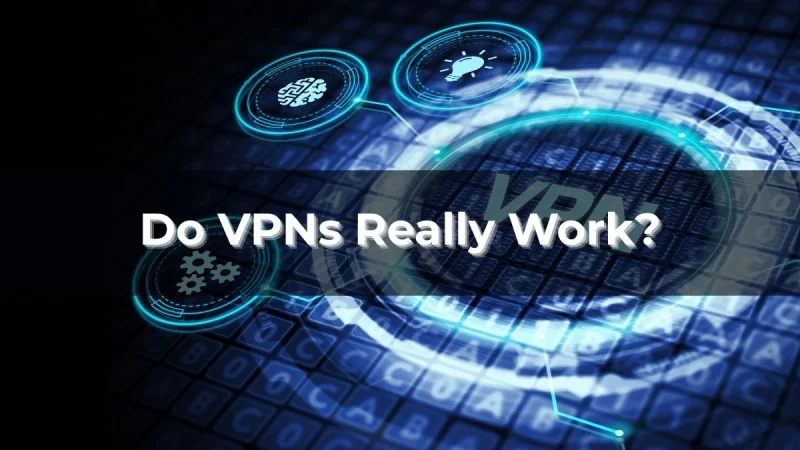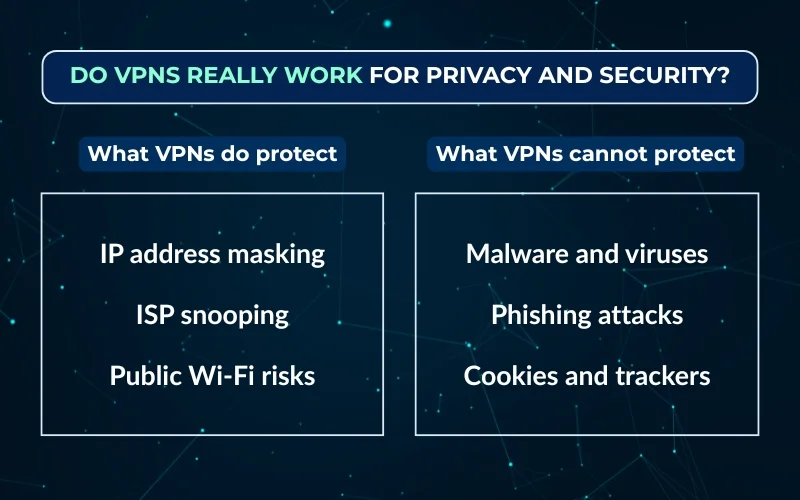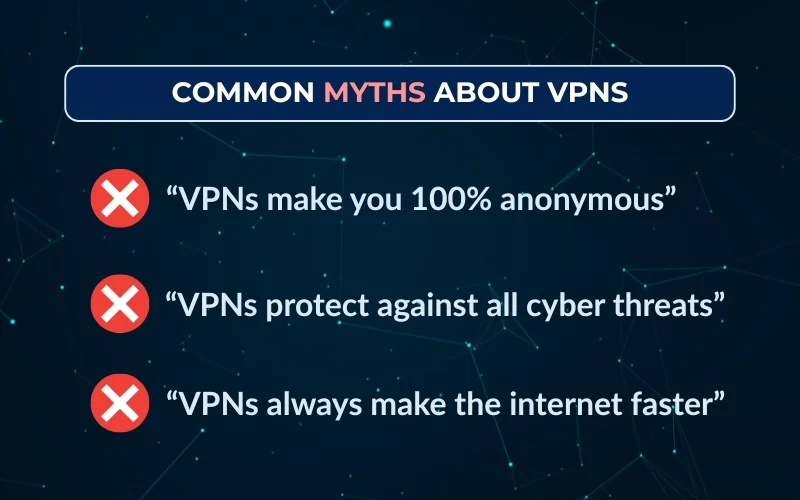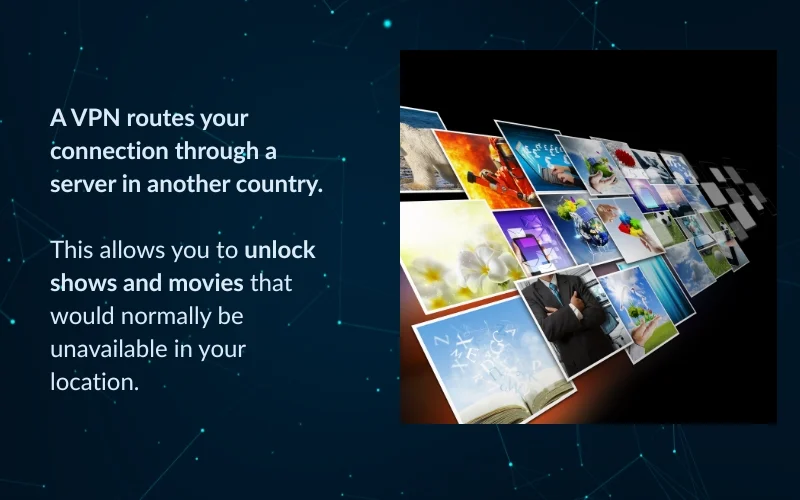Do VPNs Really Work? The Complete Truth Explained

Do VPNs really work? Yes, but only within their limits. A VPN can protect your connection from snooping and give you more privacy, yet it is not a magic shield against every online threat.
I realized this the first time I sent work files over café Wi-Fi. I worried someone could see what I was doing, so I tried a VPN. Once connected, my traffic was encrypted and my IP address was hidden, which made me feel safer sending sensitive documents. That experience showed me both the value and the limits of VPNs.
In this article, you will discover:
- What a VPN is and how it works
- What VPNs can protect and what they cannot
- Common myths and misconceptions about VPNs
- When VPNs are truly useful and when they fall short
- How to choose a VPN that actually works
Let’s begin with the basics to understand what a VPN does and how it functions.
1. What is a VPN and how does it work?
A virtual private network (VPN) is a service that secures your internet connection by creating an encrypted “tunnel” between your device and the websites or apps you use. This tunnel prevents outsiders such as your internet service provider (ISP), advertisers, or hackers on public Wi-Fi from seeing what you do online.
When you connect through a VPN, your traffic is first encrypted, then routed through a secure server operated by the VPN provider. This server assigns you a different IP address, making it appear as though you are browsing from another location. As a result, your identity and browsing activities become much harder to trace.
VPNs are widely used for privacy protection, safer access to public networks, and bypassing restrictions such as geo-blocked streaming content.
If you want to explore the technology in more depth, see our detailed guide on What is a VPN.
2. Do VPNs really work for privacy and security?
VPNs are effective at improving privacy and security, but they are not all-powerful. They protect certain aspects of your online activity while leaving others exposed. Understanding the difference helps you avoid false expectations.
2.1. What VPNs do protect
A VPN provides protection in three main areas:
- IP address masking: Your real IP is hidden, making it harder for websites and trackers to pinpoint your location.
- ISP snooping: Your internet service provider can no longer see the details of what you browse or stream.
- Public Wi-Fi risks: Data sent over unsecured hotspots is encrypted, making it far more difficult for attackers to intercept.
2.2. What VPNs cannot protect
It is important to know the limits:
- Malware and viruses: A VPN does not block malicious software. You still need antivirus protection.
- Phishing attacks: Clicking a fake email link or entering details on a fraudulent site is not prevented by a VPN.
- Cookies and trackers: Websites can still place cookies on your browser and follow your behavior across sessions.

Do VPNs really work for privacy and security?
According to the Cybersecurity and Infrastructure Security Agency (CISA), VPNs should be combined with other security measures such as endpoint protection and strong authentication to achieve meaningful security.
To better understand how VPNs interact with your IP and what information can still be exposed, check out our article on what is my IP address VPN.
2.3. Privacy vs anonymity
Many users confuse privacy with anonymity. A VPN gives you privacy by hiding your traffic and IP address from outsiders. However, it does not guarantee anonymity, because websites can still identify you through accounts you log into or other digital fingerprints.
For example, I once used a VPN while logged into my social media account. The VPN hid my IP, but the platform still knew it was me based on my profile. This showed me that VPNs help keep activity private from third parties, but true anonymity requires additional steps like using privacy-focused browsers and avoiding personal logins.
3. Common myths about VPNs
People often ask Do VPNs really work, and part of the confusion comes from common myths. To understand what VPNs can actually do, it helps to clear up these misconceptions:
- “VPNs make you 100% anonymous”
This is not true. A VPN hides your IP address and encrypts your traffic, but it does not remove other identifiers. Your online accounts, browser fingerprints, and cookies can still link activities back to you.
- “VPNs protect against all cyber threats”
A VPN is not a complete security solution. It does not block malware, prevent phishing attacks, or protect against local device threats. According to CISA, a VPN should be considered one layer in a broader defense strategy, not a replacement for firewalls, antivirus software, or safe browsing practices.
- “VPNs always make the internet faster”
VPNs do not guarantee speed improvements. In some cases, they can bypass ISP throttling or improve routing. More often, they add latency and reduce speeds, especially when connected to distant or overloaded servers. Performance gains are situational, not consistent.

Common myths about VPNs
4. Use cases: when VPNs actually work well
VPNs are not a solution for every online problem. Still, there are clear situations where they provide strong and practical benefits.
4.1. Public Wi-Fi and hotspots
Public Wi-Fi in airports, cafés, or hotels often has little or no encryption. This makes it easier for attackers to intercept unprotected data.
With a VPN, your traffic is encrypted. Sensitive information such as banking details, passwords, or emails is protected from people on the same network.
4.2. Streaming and geo-restrictions
Streaming platforms limit their libraries by region due to licensing rules.
A VPN routes your connection through a server in another country. This allows you to unlock shows and movies that would normally be unavailable in your location.
Keep in mind that some services, like Netflix or Hulu, use detection tools to block VPN connections. Success depends on both the platform and the VPN provider.
For a detailed list of reliable options, see our full guide on the best VPN for streaming.

Streaming and geo-restrictions
4.3. Torrenting and P2P sharing
Internet service providers sometimes throttle or monitor peer-to-peer (P2P) traffic.
A VPN hides this activity by encrypting it, making it harder for the provider to slow it down. This is useful for legitimate file sharing. However, using a VPN does not make illegal file distribution legal.
4.4. Bypassing censorship and firewalls
In countries with strict internet controls, users may be blocked from social media, news websites, or communication tools.
A VPN solves this by routing data through servers in regions with open access. This gives users a way to reach restricted services and maintain communication.
Some governments use deep packet inspection to detect and block VPN traffic. In certain jurisdictions, VPN use is restricted or even penalized.
5. When VPNs don’t work (limits you should know)
Do VPNs really work in every situation? The answer is no. VPNs are powerful, but they have clear limits that you need to understand.
5.1. VPN detection and blocks
Many streaming platforms, gaming services, and even governments actively block VPN traffic. They use advanced methods such as IP blacklists and deep packet inspection.
This means that even with a VPN, access to certain websites or apps may still fail.
5.2. Jurisdiction, logs, and trust issues
A VPN hides your activity from your internet provider, but you must trust the VPN company itself.
Some providers operate in countries with data retention laws or weak privacy protections. Others may keep logs of user activity, even if they claim not to.
Always review a provider’s privacy policy and independent audit results before making a choice.
5.3. Performance slowdowns and latency
Routing traffic through a VPN server adds an extra step in the connection.
As a result, speeds can drop and latency may increase, especially if the server is far away or overloaded. For activities like gaming or video calls, this can make a noticeable difference.
5.4. Legal and ethical limitations
VPNs can help bypass restrictions, but they cannot change the law.
In some countries, using a VPN to access banned services is illegal and may lead to penalties. On streaming platforms, using a VPN to unlock restricted content may also violate terms of service.
6. How to choose a VPN that truly works
Not all VPNs are equal. Some focus on speed, others on privacy, and a few balance both. When choosing a VPN, there are several key factors to check.
6.1. Security audits and no-logs policy
A trustworthy VPN should have an independent audit of its security systems and logging practices.
Look for providers that publish reports proving they do not store user activity. A clear no-logs policy, backed by third-party verification, is one of the strongest signs of reliability.
6.2. Speed and server distribution
Performance depends on server infrastructure.
A good VPN should offer:
- Servers in many countries
- High bandwidth capacity
- Options for both nearby and distant locations
These features reduce slowdowns and provide flexibility for streaming, browsing, or gaming.
6.3. Transparency and independent testing
Reputable VPNs are transparent about how they operate.
They may publish details on ownership, security architecture, or the technology they use. Independent reviews and real-world performance tests are also valuable resources for evaluating claims.
6.4. Compatibility and extra features
A VPN should work on all devices you use, including phones, laptops, smart TVs, and routers.
Some providers also offer extras like multi-hop connections, ad blocking, or dedicated IP addresses. These features are not essential for everyone, but they can add significant value depending on your needs.
Once you’ve picked a trustworthy service, the next step is proper configuration. You can follow our walkthrough on how to set up a VPN to make sure it runs securely on your devices.
7. FAQs
VPNs raise many practical questions. Below are some of the most common, with simple answers.
7.1. Can I be tracked if I use a VPN?
A VPN hides your IP address and encrypts your traffic, which makes tracking more difficult. However, websites can still identify you through cookies, browser fingerprints, or accounts you log into.
7.2. Do VPNs work on phones and smart TVs?
Yes. Most major VPN providers have apps for iOS, Android, and even smart TVs. Some services also allow setup directly on a router, which protects all devices on the network.
7.3. Do free VPNs really work?
Free VPNs often come with trade-offs. They may have limited servers, slower speeds, or weaker privacy protections. Some even log user data to make money. Paid VPNs are generally more secure and reliable.
7.4. Do VPNs protect me from hackers?
A VPN protects your data in transit, especially on unsafe networks. It does not stop malware infections, phishing attacks, or compromised accounts. For complete protection, use a VPN alongside antivirus software and safe browsing habits.
8. Conclusion
So, do VPNs really work? The answer is yes, but within clear limits. A VPN can protect your data on public networks, hide your IP address, and help you bypass restrictions. It cannot, however, block malware, stop phishing, or guarantee complete anonymity.
Here are the main takeaways to remember:
- A VPN creates an encrypted tunnel that shields your traffic from outsiders.
- It works best for public Wi-Fi, streaming access, torrenting, and bypassing censorship.
- VPNs have limits, including slower speeds, detection by streaming services, and reliance on provider trust.
- Choosing a VPN with independent audits, strong no-logs policies, and wide server coverage is essential.
I still remember the moment I first realized the value of a VPN. While working at a coffee shop, I felt uneasy sending sensitive documents through open Wi-Fi. Once I switched on a VPN, the worry disappeared, and I could focus on my work. That experience made me appreciate VPNs as practical tools, not perfect solutions.
If you apply what you have learned here, you will be able to use VPNs more effectively and avoid unrealistic expectations.
For more straightforward tech guides like this, visit the Privacy & Security Basics section on Safelyo.
Ti potrebbe interessare:
Segui guruhitech su:
- Google News: bit.ly/gurugooglenews
- Telegram: t.me/guruhitech
- X (Twitter): x.com/guruhitech1
- Bluesky: bsky.app/profile/guruhitech.bsky.social
- GETTR: gettr.com/user/guruhitech
- Rumble: rumble.com/user/guruhitech
- VKontakte: vk.com/guruhitech
- MeWe: mewe.com/i/guruhitech
- Skype: live:.cid.d4cf3836b772da8a
- WhatsApp: bit.ly/whatsappguruhitech
Esprimi il tuo parere!
Ti è stato utile questo articolo? Lascia un commento nell’apposita sezione che trovi più in basso e se ti va, iscriviti alla newsletter.
Per qualsiasi domanda, informazione o assistenza nel mondo della tecnologia, puoi inviare una email all’indirizzo [email protected].
Scopri di più da GuruHiTech
Abbonati per ricevere gli ultimi articoli inviati alla tua e-mail.
